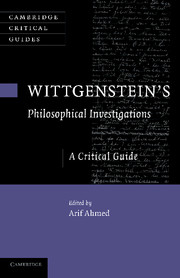Book contents
- Frontmatter
- Contents
- List of contributors
- Acknowledgments
- Introduction
- 1 From referentialism to human action: the Augustinian theory of language
- 2 What's doing? Activity, naming and Wittgenstein's response to Augustine
- 3 Measure for measure? Wittgenstein on language-game criteria and the Paris standard metre bar
- 4 Wittgenstein on family resemblance concepts
- 5 Wittgenstein on concepts
- 6 Wittgenstein vs contextualism
- 7 Wittgenstein and the linguistic turn
- 8 Rorty's Wittgenstein
- 9 Are meaning, understanding, etc. definite states?
- 10 Another strand in the private language argument
- 11 Deductive inference and aspect perception
- 12 Remembering intentions
- Bibliography
- Index
3 - Measure for measure? Wittgenstein on language-game criteria and the Paris standard metre bar
Published online by Cambridge University Press: 06 July 2010
- Frontmatter
- Contents
- List of contributors
- Acknowledgments
- Introduction
- 1 From referentialism to human action: the Augustinian theory of language
- 2 What's doing? Activity, naming and Wittgenstein's response to Augustine
- 3 Measure for measure? Wittgenstein on language-game criteria and the Paris standard metre bar
- 4 Wittgenstein on family resemblance concepts
- 5 Wittgenstein on concepts
- 6 Wittgenstein vs contextualism
- 7 Wittgenstein and the linguistic turn
- 8 Rorty's Wittgenstein
- 9 Are meaning, understanding, etc. definite states?
- 10 Another strand in the private language argument
- 11 Deductive inference and aspect perception
- 12 Remembering intentions
- Bibliography
- Index
Summary
The demi-god, Authority.
—Measure for Measure I.2A TANGIBLE STANDARD OF LENGTH
Wittgenstein has puzzled many readers by maintaining that the standard metre bar is neither one metre nor not one metre in length. In a famous passage, he writes:
50 …There is one thing of which one can say neither that it is one metre long, nor that it is not one metre long, and that is the standard metre in Paris.
The standard metre bar surely has some length, and it is odd to say of it – as the paradigm for precisely this one metre unit of measure – that it is not itself of this length. More interesting is Wittgenstein's assertion that the Paris standard metre bar cannot be said to be either one metre or not one metre in length. This suggests that, having been elevated by convention to the status of representing a particular metric unit, the standard metre bar has somehow managed to defy the law of excluded middle. If the standard metre is neither one metre nor not one metre in length, then it would seem not to have any length at all.
What Wittgenstein might have in mind is something like what Gilbert Ryle (1949: 16–23), himself borrowing heavily although not always faithfully from the later Wittgenstein, referred to as a category mistake. There are many such mistakes to beware, including the classic instance of asking to be shown the college after touring all the buildings and grounds.
Keywords
- Type
- Chapter
- Information
- Wittgenstein's Philosophical InvestigationsA Critical Guide, pp. 49 - 65Publisher: Cambridge University PressPrint publication year: 2010
- 2
- Cited by



